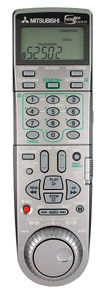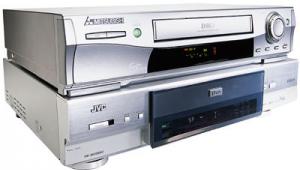Mitsubishi HS-HD2000U & JVC HM-DH30000U D-VHS VCRs Page 2
 The JVC also offers that component-video output. For now, the Mitsubishi—in the high-definition world at least—is intended to work primarily with TVs using the 1394 connection.
The JVC also offers that component-video output. For now, the Mitsubishi—in the high-definition world at least—is intended to work primarily with TVs using the 1394 connection.
The Mitsubishi also lacks a digital audio output for Dolby Digital, which is the standard for high-definition recording. Again, Mitsubishi HDTVs do have that output (as do some Sony and Thomson sets), another reason this deck is best used with one of those sets.
The Mitsubishi comes with cables that allow you to control a satellite receiver from the VCR so you can record satellite programming. The JVC lacks this, but most satellite receivers these days come with their own cables that allow you to control a VCR.
All in all, in terms of functionality alone, the Mitsubishi beats the JVC.
Performance
First, I played the prerecorded high-definition tape that came with each machine. JVC's tape was a D-Theater recording of slow-moving Japanese scenery, Mitsubishi's a straight HD recording including cuts from several recent on-air high-definition productions, like The Sopranos. I don't know if it was simply the recording quality or some pernicious side effect of D-Theater, but the Mitsubishi tape was demonstrably clearer and better-defined.
Next I recorded over-the-air programming using both machines and new, blank Maxell D-VHS tapes. Both players can record 150 minutes of HD on one cassette. I picked up loop HD programming from WETA-HD, the local PBS station's digital channel, and a couple of shows on CBS.
It was a toss-up. Both machines' recording quality was excellent—I had to look hard to detect a loss of resolution from either. I think there was a tiny dropoff, but if so, it was insignificant. Both machines added a slight veneer of video noise to the signal, but again, this was barely noticeable.
Conclusions
I had no significant complaint about the recording capabilities of either the Mitsubishi HS-HD2000U or the JVC HM-DH30000U. They performed equally well, and that performance was excellent. You'll have to judge for yourself whether the JVC's D-Theater capability is important for you; if it is, consider waiting until JVC comes out with its cheaper player before deciding whether to buy one. In my view, $2000 is too much to pay for a VCR, even with D-Theater. If D-Theater is not important to you, and you have a television equipped with an IEEE 1394 connection, then I recommend the Mitsubishi HS-HD2000U for its superior functionality.
But remember: Either of these machines could easily be made obsolete. If you buy a Mitsubishi HDTV, or another TV with IEEE 1394 input/output, you're more or less guaranteed that the VCR will retain its functionality through the life of the TV. But if you want to buy one of these VCRs for use with an HDTV you intend to buy in the future, there's no guarantee that the set you ultimately choose will include a 1394 connection. Some companies may offer only Digital Video Interface (DVI), which does not allow recording under any circumstances. While the JVC will still play back through its component video outputs, both of these VCRs will be useless as HD recorders with such a set.
With those important caveats, the Mitsubishi HS-HD2000U and the JVC HM-DH30000U are both good performers. Which might be right for you will depend on how you intend to use it.
Addendum: At press time, Mitsubishi announced a second D-VHS model, the HS-HD1100U, which at $749 offers most but not all of the features of the HS-HD2000U. See “Behind the Scenes” for more details.
- Log in or register to post comments















































